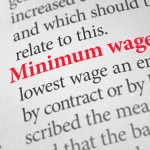We’re less than 2 months away from the start of the new financial year, so it’s the right time to take a look at what’s new for 2019-20.
It’s a little bit number heavy but the tables giving comparison with last years percentages and thresholds making it easier to pick your way through. Grab a coffee and a biscuit and let’s get cracking!
Employee Personal Allowance, Tax Thresholds and Rates
The employee personal allowance will increase from £11,850.00 to £12,500.00 from April. This means that an employee with a tax code of 1185L this year will most likely be given a tax code of 1250L in 2019-20, increasing the amount that an employee can earn each pay period before paying tax on their earnings.
The thresholds where the higher and additional tax rates begin have also increased for the coming financial year.
The table below compares the thresholds from 2018-19 to 2019-20.
| PAYE tax rates and thresholds | 2018-19 | 2019-20 | Effect |
|
Employee personal allowance
|
£228.00 per week £998.00 per month £11,850.00 per year |
£240.00 per week £1,042.00 per month £12,500.00 per year |
Increased by: £12.00 per week £44.00 per month £650.00 per year |
| English and Northern Irish basic tax rate | 20% on annual earnings above the PAYE tax threshold and up to £34,500.00 | 20% on annual earnings above the PAYE tax threshold and up to £37,500.00 | Increase of £3,000.00 |
| English and Northern Irish higher tax rate | 40% on annual earnings from £34,501.00 to £150,000.00 | 40% on annual earnings from £37,501.00 to £150,000.00 | Increase of £3,000.00 |
| English and Northern Irish additional tax rate | 45% on annual earnings above £150,000.00 | 45% on annual earnings above £150,000.00 | No change |
Class 1 National Insurance Thresholds
The National Insurance thresholds have increases slightly for the new financial year, meaning that employees can earn more money before National Insurance is deducted from their pay. National Insurance is only deducted from earnings over the Lower Earnings Limit.
| Class 1 National Insurance thresholds | 2018-19 | 2019-20 | Effect |
| Lower Earnings Limit (LEL) |
£116.00 per week £503.00 per month £6,032.00 per year |
£118.00 per week £512.00 per month £6,136.00 per year |
Increased by: £2.00 per week £9.00 per month £104.00 per year |
| Primary Threshold (PT) |
£162.00 per week £702.00 per month £8,424.00 per year |
£166.00 per week £719.00 per month £8,632.00 per year |
Increased by: £4.00 per week £17.00 per month £208.00 per year |
| Secondary Threshold (ST) |
£162.00 per week £702.00 per month £8,424.00 per year |
£166.00 per week £719.00 per month £8,632.00 per year |
Increased by: £4.00 per week £17.00 per month £208.00 per year |
| Upper Secondary Threshold (under21) (UST) |
£892.00 per week £3,863.00 per month £46,350.00 per year |
£962.00 per week £4,167.00 per month £50,000.00 per year |
Increased by: £70.00 per week £304.00 per month £3,650.00 per year |
| Apprentice Upper Secondary Threshold (apprentice under 25) (AUST) |
£892.00 per week £3,863.00 per month £46,350.00 per year |
£962.00 per week £4,167.00 per month £50,000.00 per year |
Increased by: £70.00 per week £304.00 per month £3,650.00 per year |
| Upper Earnings Limit (UEL) |
£892.00 per week £3,863.00 per month £46,350.00 per year |
£962.00 per week £4,167.00 per month £50,000.00 per year |
Increased by: £70.00 per week £304.00 per month £3,650.00 per year |
Class 1 National Insurance Rates – Employee Contributions
The percentages applied to calculate employees national insurance based on the threshold limits are shown below.
The National Insurance contribution percentage have not changed from 2018-19.
| National Insurance category letter | Earnings at or above LEL up to and including PT | Earnings above the PT up to and including UEL | Balance of earnings above UEL |
| A | 0% | 12% | 2% |
| B | 0% | 5.85% | 1% |
| C | nil | nil | nil |
| H (Apprentice under 25) | 0% | 12% | 2% |
| J | 0% | 2% | 2% |
| M | 0% | 12% | 2% |
| Z (under 21 – deferment) | 0% | 2% | 2% |
Class 1 National Insurance Rates – Employer Contributions
The percentages applied to calculate employers national insurance based on the threshold limits are shown below.
The National Insurance contribution percentage have not changed from 2018-19.
| National Insurance category letter | Earnings at or above LEL up to and including PT | Earnings above the PT up to and including UEL/UST/AUST | Balance of earnings above UEL/UST/AUST |
| A | 0% | 13.8% | 13.8% |
| B | 0% | 13.8% | 13.8% |
| C | 0% | 13.8% | 13.8% |
| H (Apprentice under 25) | 0% | 0% | 13.8% |
| J | 0% | 13.8% | 13.8% |
| M (under21) | 0% | 0% | 13.8% |
| Z (under 21 – deferment) | 0% | 0% | 13.8% |
National Minimum Wage
The National Minimum Wage is the minimum wage you must pay your employees, and is based on their age. This has increased from 2018-19, and the table below shows a comparison.
| Category of Worker | 2018-19 Hourly rate | 2019-20 Hourly rate | Effect |
| Aged 25 and above (national living wage rate) | £7.83 | £8.21 | Increase of £0.38 |
| Aged 21 to 24 inclusive | £7.38 | £7.70 | Increase of £0.32 |
| Aged 18-20 | £5.90 | £6.15 | Increase of £0.25 |
| Aged under 18 (but above compulsory school leaving age) | £4.20 | £4.35 | Increase of £0.15 |
| Apprentices aged under 19 | £3.70 | £3.90 | Increase of £0.20 |
| Apprentices aged 19 and over, but in the first year of their apprenticeship | £3.70 | £3.90 | Increase of £0.20 |
Statutory Maternity, Paternity, Adoption and Shared Leave Pay
The weekly payment for maternity, paternity, adoption and shared leave has increased from £145.18 to £148.68. Information relating to employee eligibility and how to calculate and manage these payments can be found by following the links below:
Maternity pay and leave – https://www.gov.uk/maternity-pay-leave
Statutory paternity pay – https://www.gov.uk/employers-paternity-pay-leave
Statutory adoption pay – https://www.gov.uk/employers-adoption-pay-leave
Statutory shared parental pay – https://www.gov.uk/shared-parental-leave-and-pay-employer-guide
Recovery of statutory payments – https://www.gov.uk/recover-statutory-payments
Statutory Sick Pay
Employees are entitled to a payment of £94.25 per week. This has increased from £89.35 per week in 2018-19.
The employee is entitled to this payment regardless of whether they are a full-time or part-time employee. Once the employee has been absent due to sickness for 4 ‘qualifying days’, the SSP daily rate is based on the number of qualifying days the employee works each week. The table below breaks down the daily rate based on the number of days the employee works.
| Unrounded daily rate | Number of QDs in week | 1 day to pay | 2 days to pay | 3 days to pay | 4 days to pay | 5 days to pay | 6 days to pay | 7 days to pay |
| £13.4642 | 7 | £13.47 | £26.93 | £40.40 | £53.86 | £67.33 | £80.79 | £94.25 |
| £15.7083 | 6 | £15.71 | £31.42 | £47.13 | £62.84 | £78.55 | £94.25 | |
| £18.8500 | 5 | £18.85 | £37.70 | £56.55 | £75.40 | £94.25 | ||
| £23.5625 | 4 | £23.57 | £47.13 | £70.69 | £94.25 | |||
| £31.4166 | 3 | £31.42 | £62.84 | £94.25 | ||||
| £47.1250 | 2 | £47.13 | £94.25 | |||||
| £94.24 | 1 | £94.25 |
Student Loan and Postgraduate Loan Recovery
In previous years, student loan repayments have been moved into payroll processing with a set percentage being taken from an employees pay above the earnings threshold. From the new financial year Postgraduate loans will be treated the same way.
The table below shows the comparison.
| Rate or threshold | 2018-19 rate | 2019-20 rate | Effect |
| Employee earnings threshold for Student loan Plan 1 |
£18,330.00 per year £1,527.50 per month £352.50 per week |
£18,935.00 per year £1,577.91 per month £364.13 per week |
Increase of: £605.00 per year £50.41 per month £11.63 per week |
| Employee earnings threshold for Student loan Plan 2 |
£25,000.00 per year £2,083.33 per month £480.76 per week |
£25,725.00 per year £2,143.75 per month £494.71 per week |
Increase of: £725.00 per year £60.42 per month £13.95 per week |
| Student loan deduction | 9% | 9% | n/a |
| Employee earnings threshold for Postgraduate loan | n/a |
£21,000.00 per year £1,750.00 per month £403.84 per week |
n/a |
| Postgraduate loan deduction | n/a | 6% | n/a |
You made it! That’s a quick overview of the thresholds and rates for 2019.
There’s more information available relating to expenses and benefits, and PAYE settlement agreements. There’s also additional information relating company cars and employee vehicle fuel rates and mileage payments. Information about these can be found on the Gov.UK website at:
https://www.gov.uk/guidance/rates-and-thresholds-for-employers-2019-to-2020
But PayrollAbility is here to save you the difficulty of trawling through this. We can take care of your payroll and ensure you’re compliant whilst making your life simpler and easier.
Call the office today on 01384 92 90 20.
We’ll speak to you soon.





